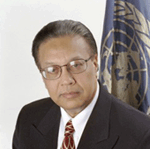Donors try to “deny, dilute, delay and divide” LDCs
Published on Fri, 2011-05-06 18:03
Sources: “Major Salvaging Needed for LDC IV in Istanbul”, by Anwarul k. Chowdhury: http://bit.ly/iUGLfA More than forty heads of government and high officers representing 48 countries with a population of 880 million people. A week of discussion. One official meeting and three parallel forums arranged for civil society, the business sector and the parlamentarians. But the week-long fourth Conference on the Least Developed Countries (UNLDC IV) that will begin this Monday in Istanbul “does not promising at all”, according to Bangladeshi ambassador Anwarul K. Chowdhury, former UN Under-Secretary-General. A mood of desperation and disappointment seem to be pervasive. The upbeat atmosphere that existed ahead of all previous three conferences is nowhere to be seen,” wrote Chowdhury, also former UN High Representative for the Least Developed Countries, Landlocked Developing Countries and Small Island Developing States in a column for Inter Press Service (IPS) news agency. “These countries do not attract world’s attention unless they are engulfed in conflict or devastated by natural disasters.” “The usual, insensitive bickering of the United Nations negotiating process has been visible” in the way to the Conference, added the diplomat. The preparations of the meeting “took the path of working on an outcome that lacked any spark worthwhile for energizing the LDCs”. According to Chowdhury, “an expression that is going around is abbreviated as "4Ds" which the LDC delegates believe explain very well the current attitude of the development partners”, for “deny, dilute, delay and divide”, that “are the strategic steps” showed by the rich countries. The meeting “falls far short of the expectation of all who believe that the international community owes a special supportive obligation for the suffering LDCs, particularly in times of current global economic meltdown that has been made more unbearable as a result of the on-going food, fuel and financial crises,” he warned. “Remember a key criterion for being identified by the UN as an LDC is vulnerability to external shocks that originate beyond their national boundaries. The recent world-wide rise in food and fuel prices has accentuated that vulnerability seriously jeopardizing the domestic programmes that aim at reducing poverty and meeting the basic needs of their vulnerable and disadvantaged.” “The European Union and its members who had played a key role in the positive results of the last three LDC conferences have been rather hesitant in pushing for a creative forward-looking agenda for LDCs. US and Japan as major donors have also been dragging their feet,” he wrote. “To regain some credibility, the world leaders gathering next week in Istanbul need to live up to their responsibility to look after those whose needs are the greatest. To show leadership, the United Nations and its Secretary-General should be at the helm steering the international community's efforts to get these countries out of the morass made worse by, in his own words, the global ‘development crisis’, Chowdhury added. But “unless some extraordinary efforts are made to salvage Istanbul by them, a promising opportunity will be lost and the UNLDC IV will be doomed to fail.” The LDC-IV will take place at Istanbul's Lutfi Kirdar Congress Center on May 9 and 13. The civil Society Forum, one of the most important parts of the conference, will convene on May 8. The LDC-I was held in Paris in 1981, the second, also in Paris, in 1990. The third conference convened in Brussels in 2001. Besides, while partnership and support received by LDCs from traditional donors is often "far from adequate", exchange of resources, technology, knowledge and best practices between developing countries —generally referred to as South-South cooperation (SSC)— is gaining momentum, Josephine Ojiambo, ambassador of Kenya to the U.N. and president of the U.N. General Assembly High-Level Committee on SSC, told IPS. “The countries of the South are a tremendous source of tested solutions to development challenges faced by all developing countries especially the LDCs. SSC offers new concrete ideas, models and practices for LDCs and thus provides major additional opportunities. Additionally, Southern countries tend to offer technologies and solutions that are more appropriate to the special needs and circumstances of LDCs, given their similarities in environment, background or development path,” Ojiambo said. “China, India, Brazil and South Africa in particular have become important sources of development financing for LDCs,” she added. |
SUSCRIBE TO OUR NEWSLETTER



